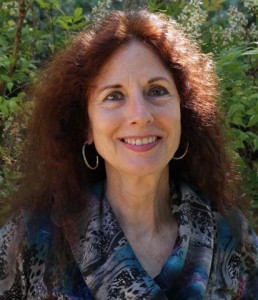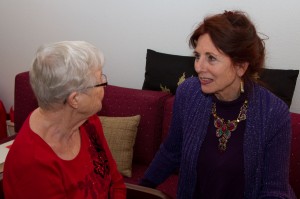Today, SevenPonds speaks with Dhyanis Carniglia, a certified Heartbreak to Happiness® coach who studied at Aurora Winter’s Grief Coach Academy. She has written two books, Moving Past Grief – My Journey back to Joy and The Chakra Clearing Guidebook. She also teaches dance and writes a blog on grief and recovery. Today she is with us from Marin County to talk about grief coaching.
Christopher: What is grief coaching?
Dhyanis: It’s basically a 9-step recipe to help someone from heartbreak to happiness. So it’s not like talk therapy; there are actual processes, although yes I am very attentive to the person’s specific grief and what they need in particular.
This is all done through telephone. There are no distractions, and you can really hear emotional nuances. No travel, no driving—which, for many people in grief, is not a good idea. It’s like we have our own little zone. I encourage people to really vent because a major cause of stress is to keep those feelings inside, since we tend to repress them in our culture.
I myself lost my only child and father in a car accident while my mother was driving and it was a giant family turmoil. My own experience is one of my biggest qualifications. Having come through and made a good life, I can offer hope to other people. At the same time, I’m not there to appear wise or knowledgable. The process is mostly driven by the person. I happen to have some tools they can use.
Christopher: If someone’s idea of grief is connected to their religious beliefs, how do religious affiliations fit in to grief coaching?
Dhyanis’s key points for those interested in grief coaching:
1. The grief coach is not there to fix or rescue but to accept the person as they really are.
2. You learn some stress release skills through these processes. And you can take into your other areas of life.
3. It may seem unusual to look for the gifts of grief. One of the great advantages of having a coach to help you live not by default but by design.
Dhyanis: We say the god of your understanding, whatever degree or type of spiritual support system one may have, will come into play. We let the person guide that. We ask where his or her spiritual connection is on a scale of 1-10. Then they can tell me their entire philosophy or system of belief. Whatever the person has, we build on it.
Christopher: So the emphasis is not just to out of grief, but to transform it into joy and enthusiasm?
Dhyanis: You’ve picked the right word: enthusiasm. The greek root means to be filled with spirit. The point is indeed to transform the grief. The first step is to take a few steps out of the well—as long as they’re in it, they can’t see the light—and I’ll give them a ladder and we’ll have to climb through some emotions first, such as anger, until we get to the grass and look around and see the new landscape of his or her life. A new normal. Grief changes everything.
“We say the god of your understanding, whatever degree or type of spiritual support system one may have, will come into play.”
Christopher: Is there a moment or epiphany when they realize they’re through the grieving process, or is it gradual?
Dhyanis: Everyone’s different, but some people people say that they’re completely done after 10 calls. This one woman in idaho (another good part about grief coaching: it can be done anywhere) who after 10 calls said she didn’t want me to call her in order to see if she had healed. And she had. She lost her husband of 60 years, she had recently been diagnosed with cancer of the spine, and then she lost her grandson in a tragic incident. She could not even get up to make her protein drinks which was all she could manage to eat. But at the end of 10 calls she was working at home doing publicity for one of her favorite poetry organizations. Some epiphany happened to her about her husband. She wouldn’t have done anything differently, would still have married him, even have him leave first. I’m always astounded how in a matter of weeks—say 10 or 20 phone calls—people go from not taking care of themselves to feeling like they’ve come back to life. It may sound like a big claim, but it’s so authentic. It works.
Christopher: There are general aspects of grief that can apply to anyone, but you also fill a niche through your experience of losing a child. Is grief somewhat related to identity and identifying with others? Are there types of grief exclusive to men or women?
Dhyanis: Well, I think people are people. As a dance instructor, I’ve worked mostly with women. But I’ve learned that there are always exceptions, and I don’t have to limit what I do to women or the death of a child. Right now I have a male client going through a very tough divorce. They don’t have to be women or have lost a child, though it is a specialty since I have direct experience.
“I’m always astounded how in a matter of weeks—say 10 or 20 phone calls—people go from not taking care of themselves to feeling like they’ve come back to life. It may sound like a big claim, but it’s so authentic. It works.”
Christopher: Is there anything else you would like our readers to know?
Dhyanis: On my website and blog, I have some useful tips for people in grief or helping others with grief, especially through the holidays. For example, make sure take care of yourself. It seems simple but it’s one thing people in grief don’t attend to. Or how to talk to grieving family and friends: try not to get fixated on saying the right thing. Simply giving your presence is the best way to help.
Christopher: Thank you for speaking with us today!
Dhyanis: Of course!
More Professional Advice interviews from SevenPonds:
- What is Music Thanatology? An Interview with Sharilyn Cohn
- How Does Yoga Aid the Grieving Process? An Interview with Antonio Sausys
- What Are the Tools for Meditating While Dying? An Interview With Maneesha James

 What is Grief Coaching? An Interview with Dhyanis Carniglia
What is Grief Coaching? An Interview with Dhyanis Carniglia




 The Other Death in the Family
The Other Death in the Family
















